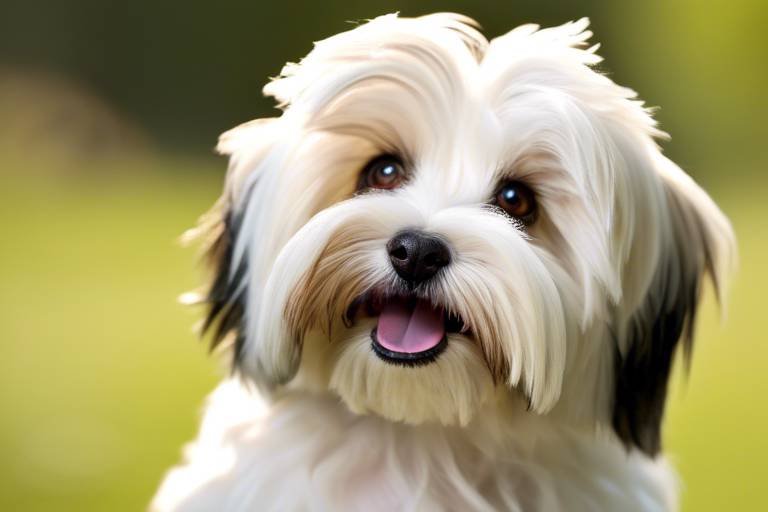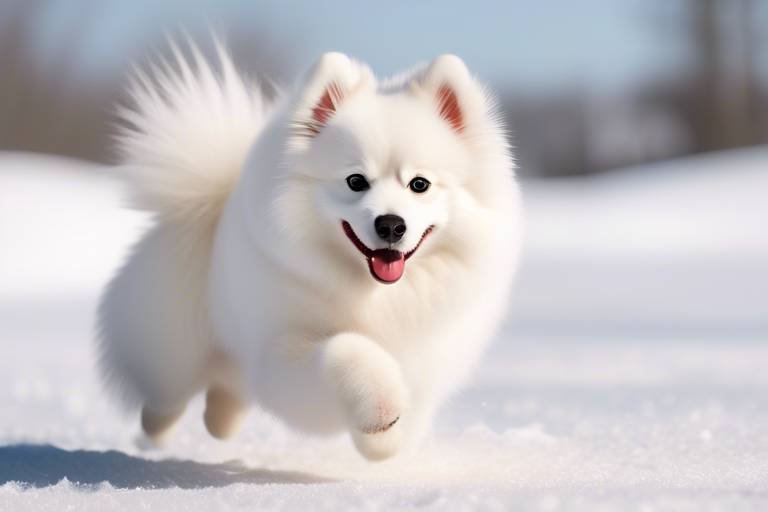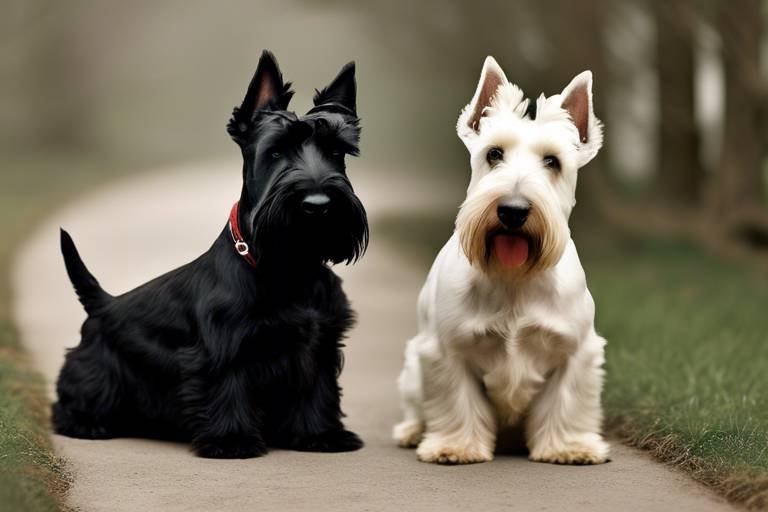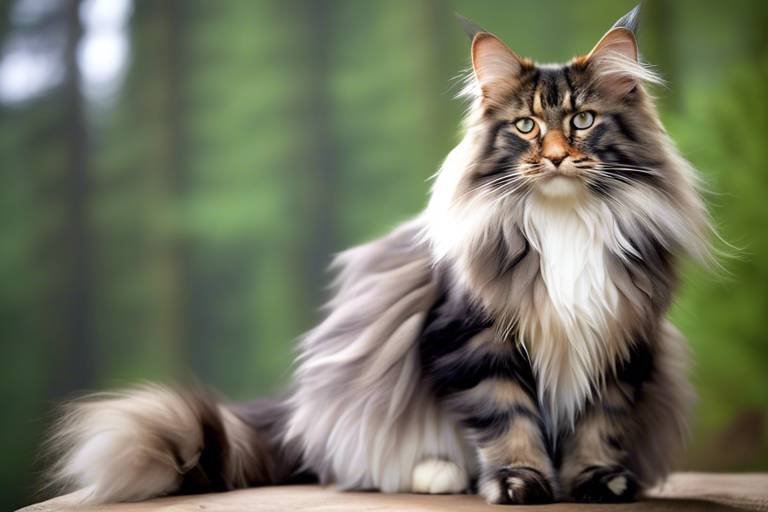The Unique Traits of Havanese Dogs
Havanese dogs are a delightful breed that captures the hearts of many dog lovers around the world. Known for their charming personalities and adorable looks, these little furballs bring joy and companionship to families of all sizes. But what exactly makes Havanese dogs so special? In this article, we will explore their distinctive characteristics, including their temperament, physical appearance, and the essential care they require. Whether you are considering adding a Havanese to your family or simply want to learn more about this wonderful breed, you’re in the right place!
One of the most striking features of Havanese dogs is their friendly and affectionate nature. These little dogs are known for being incredibly sociable, often forming strong bonds with their families and other pets. Imagine a dog that greets you with a wagging tail and a happy dance every time you walk through the door; that’s the Havanese for you! They thrive on human interaction and love to be part of family activities, making them excellent companions for both adults and children.
Havanese dogs are also known for their playful demeanor. They enjoy games and activities that stimulate their minds and bodies. This breed is often described as intelligent and curious, which means they love to explore their surroundings and engage with their environment. Their social nature makes them great with kids, and they often display a protective instinct towards their loved ones.
When it comes to looks, Havanese dogs are simply irresistible. They have a distinctive appearance that combines elegance with a playful charm. Typically, they have a sturdy build, and their small size makes them perfect for apartment living. Most Havanese dogs weigh between 7 to 13 pounds and stand about 8.5 to 11.5 inches tall at the shoulder. Their expressive eyes and fluffy coats give them a unique charm that is hard to resist.
The Havanese breed is celebrated for its beautiful coat, which can come in a variety of types and colors. Their silky hair can be straight or slightly wavy, and it is often described as hypoallergenic, making them a good choice for allergy sufferers. Some of the most common colors include:
- White
- Black
- Chocolate
- Gold
- Brindle
This variety not only enhances their overall appearance but also allows for a unique personality to shine through each individual dog.
Keeping a Havanese's coat healthy and beautiful requires regular grooming. Their long hair can easily mat if not cared for properly, so it’s essential to brush them at least a few times a week. Additionally, regular baths help maintain their coat's cleanliness and shine. Many Havanese owners opt for professional grooming every few months to ensure their furry friends look their best.
As mentioned earlier, Havanese dogs are small yet sturdy. Their compact size makes them incredibly adaptable to various living situations, whether it be a cozy apartment or a spacious house. Despite their small stature, they are quite energetic and require regular exercise to stay healthy. Daily walks and playtime are essential for keeping these little dogs happy and fit.
Like all breeds, Havanese dogs have specific health concerns that potential owners should be aware of. Common issues include hip dysplasia, eye problems, and heart conditions. Regular vet check-ups, a balanced diet, and proper exercise can help mitigate these risks and ensure your Havanese lives a long, healthy life.
Training is crucial for Havanese dogs due to their intelligent nature. They are eager to please, which makes them relatively easy to train. However, early socialization is key to helping them develop into well-rounded adults. Introducing them to various environments, people, and other animals from a young age will help them become confident and adaptable.
Obedience training is essential for Havanese dogs to develop good manners. Positive reinforcement methods, such as treats and praise, work wonders with this breed. It’s important to keep training sessions short and engaging to hold their attention. With patience and consistency, your Havanese will learn commands and tricks in no time!
Proper socialization is vital for Havanese dogs. Start by exposing them to different environments, sounds, and people. Puppy classes can be a great way to facilitate this process. Remember, the more experiences your Havanese has, the more comfortable they will be in various situations.
Havanese dogs make excellent family pets. Their loving disposition and playful nature make them a perfect fit for families with children. They are typically gentle and patient, which allows them to interact well with kids. In fact, many families find that their Havanese becomes a beloved member of the household, forming strong bonds with every family member.
Havanese dogs are generally great with kids. Their playful nature means they enjoy running around and playing games, making them wonderful companions for children. They have a knack for sensing when kids need a friend or a cuddle buddy, and they are always ready to provide comfort and companionship.
When introducing Havanese dogs to other pets, certain dynamics come into play. Most Havanese get along well with other animals, but it’s important to supervise initial interactions to ensure everyone feels safe and comfortable. With proper introductions and socialization, Havanese can coexist happily with other pets in the household.
1. Are Havanese dogs hypoallergenic?
Yes, Havanese dogs are often considered hypoallergenic due to their low-shedding coats, which can be a suitable option for allergy sufferers.
2. How much exercise do Havanese dogs need?
Havanese dogs require regular exercise, including daily walks and playtime, to stay healthy and happy.
3. Are Havanese dogs good with children?
Absolutely! Havanese dogs are known for their gentle and playful nature, making them great companions for children.
4. How often should I groom my Havanese?
Regular grooming is essential for Havanese dogs. It's recommended to brush them several times a week and schedule professional grooming every few months.
5. What health issues are common in Havanese dogs?
Like all breeds, Havanese dogs can be prone to certain health issues, including hip dysplasia, eye problems, and heart conditions.

Temperament of Havanese Dogs
Havanese dogs are renowned for their friendly and affectionate nature, making them one of the most beloved companion breeds. These little furballs are not just pets; they are family members who thrive on human interaction. Their sociable behavior is evident in how they greet family members, often with a wagging tail and a playful bark. Imagine coming home after a long day, and there they are, bouncing with joy, ready to shower you with love. This is the essence of a Havanese's temperament.
What sets Havanese apart is their ability to connect with people of all ages. Whether it’s a toddler or a senior, they seem to have an innate understanding of how to behave around different individuals. Their gentle disposition makes them ideal companions for children, as they are patient and playful, often engaging in games of fetch or simply lounging around for a cuddle session. They possess a natural charm that endears them to everyone they meet.
Moreover, Havanese dogs are known for their curiosity. They love to explore their surroundings and are always eager to join in on family activities. Whether it’s a trip to the park or a cozy movie night at home, these dogs are up for anything as long as they are with their loved ones. Their playful antics can bring a smile to even the grumpiest of faces, and their affectionate nature ensures that they are never far from your side.
However, it’s important to note that their sociable nature requires proper socialization from a young age. Without it, they can become overly attached or develop separation anxiety. This makes early training and exposure to different environments crucial. Just like a child needs to learn how to interact with others, Havanese dogs benefit immensely from meeting new people and pets. This not only shapes their personality but also builds their confidence.
In summary, the temperament of Havanese dogs is characterized by their loving, playful, and curious nature. They are a breed that thrives on companionship and interaction, making them perfect for families and individuals alike. If you’re looking for a loyal friend who will shower you with affection and keep you entertained, a Havanese dog might just be the perfect fit for you!
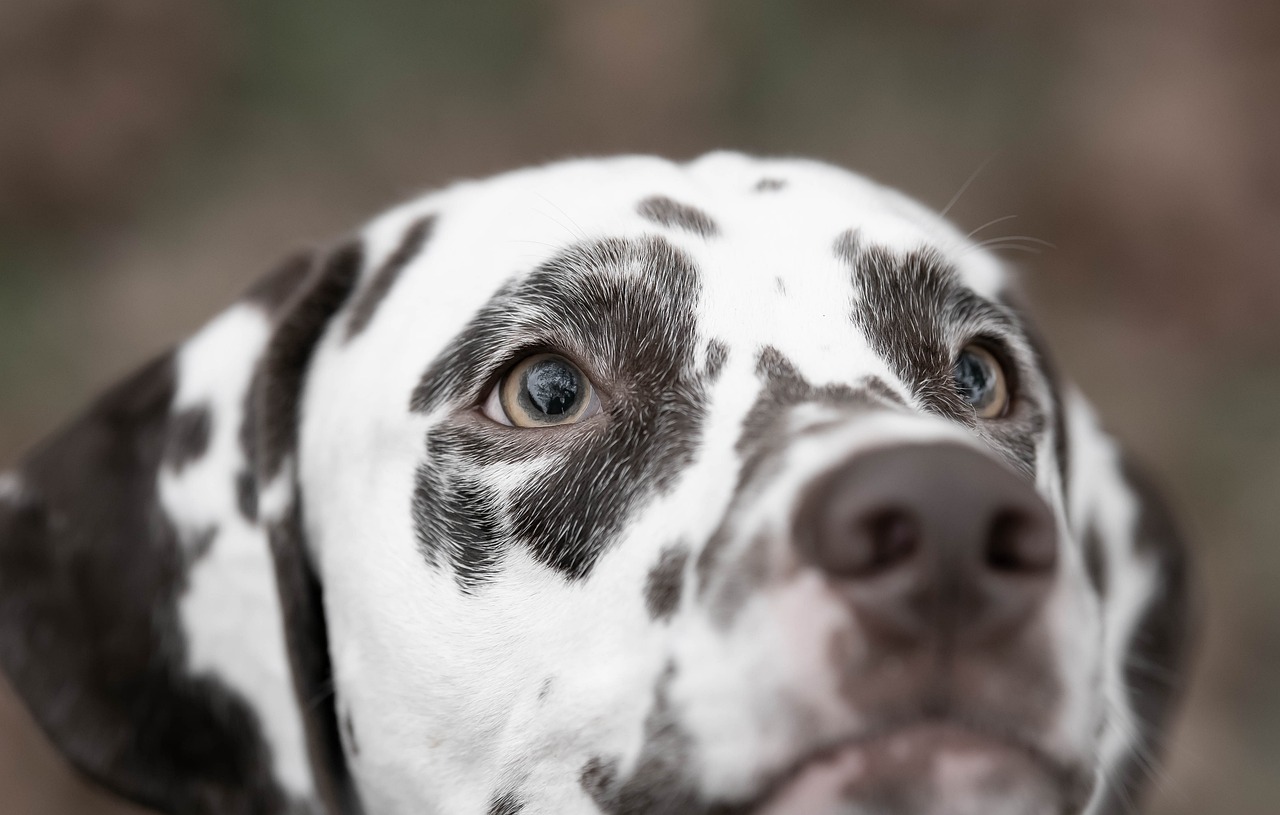
Physical Appearance
The Havanese breed is not just another cute dog; they are a bundle of joy wrapped in a charming package. Standing at a height of about 8.5 to 11.5 inches, these little furballs are perfectly sized for cuddling and companionship. Their bodies are compact yet sturdy, giving them a robust appearance that belies their small stature. One of the most striking features of the Havanese is their luxurious coat, which can be both a delight to behold and a challenge to maintain. This breed sports a double coat that is soft, silky, and often wavy, making them a favorite among dog lovers who appreciate a bit of fluff!
When it comes to colors, Havanese dogs are like a painter's palette, showcasing a variety of hues that can include white, black, chocolate, gold, and even combinations of these colors. The diversity in their coat colors adds to their overall appeal, making each Havanese unique. But it’s not just about the colors; their expressive eyes and playful demeanor make them incredibly endearing. Imagine a small dog with big, bright eyes that seem to sparkle with mischief and joy – that’s a Havanese for you!
The coat of a Havanese can come in several types, including straight, wavy, or curly, and it varies in length. The most common is the wavy coat, which is soft and fluffy, providing a warm hug of fur. This breed's coat is also known for its non-shedding quality, making them a great option for allergy sufferers. However, with this beautiful coat comes the responsibility of regular grooming. To keep their fur looking its best, Havanese owners should brush their dogs at least a few times a week to prevent matting and tangling.
Grooming a Havanese is not just about keeping them looking fabulous; it’s essential for their health too. Regular grooming sessions can help you bond with your furry friend while ensuring their coat remains free of tangles and dirt. A good grooming routine includes:
- Brushing their coat several times a week.
- Bathing them every 4 to 6 weeks, or as needed.
- Trimming their nails regularly to keep them comfortable.
- Cleaning their ears and teeth to prevent infections.
In terms of size, Havanese dogs typically weigh between 7 to 13 pounds, making them one of the smaller breeds. Their compact build allows them to be agile and playful, which is perfect for families with children. Despite their small size, they are surprisingly sturdy and can hold their own during playtime. This unique combination of small stature and robust build makes them ideal companions for various living situations, from apartments to larger homes.
While Havanese dogs are generally healthy, they can be prone to certain health issues, such as hip dysplasia and eye problems. Regular veterinary check-ups and a balanced diet can help mitigate these risks. Keeping an eye on their weight is also crucial, as obesity can lead to further health complications. By being proactive about their health, you can ensure your Havanese remains a vibrant part of your family for years to come.
Coat Types and Colors
The Havanese breed is not only known for its delightful personality but also for its stunning coat types and colors that can make anyone stop and admire them. Their fur is one of their most distinctive features, and it comes in a variety of textures and shades, making each Havanese unique in its own right. Generally, Havanese coats can be classified into two main types: the silky coat and the curly coat. The silky coat is smooth and flowing, giving the dog a graceful appearance, while the curly coat has a more textured look, providing a playful and bouncy feel.
When it comes to colors, Havanese dogs offer a delightful palette that can include:
- White
- Black
- Chocolate
- Gold
- Silver
- Brindle
- Parti-color (a mix of two colors)
This wide range of colors not only adds to their visual appeal but also allows for a sense of individuality among Havanese dogs. For instance, a Havanese with a chocolate coat and white markings can look completely different from one that is entirely black or golden. This diversity is part of what makes owning a Havanese so exciting; you never know exactly what you will get in terms of looks!
Another fascinating aspect of Havanese coats is the way they can change over time. Puppies often have a different coat texture and color than they do as adults. For example, a puppy might start with a darker coat that lightens as they mature, or they might have a wavy coat that becomes more curly as they grow. This transformation can be surprising and delightful for owners, as they watch their furry companions evolve.
It's important to note that the beauty of the Havanese coat comes with responsibility. Regular grooming is essential to keep their fur healthy and free from tangles. A well-maintained coat not only looks good but also contributes to the dog's overall health and comfort. Owners should invest time in brushing their Havanese several times a week and consider professional grooming every few months to maintain that stunning appearance.
In summary, the coat types and colors of Havanese dogs are a significant part of their charm. With their silky or curly fur and a wide array of colors, these dogs are truly a sight to behold. Whether you prefer a classic black Havanese or a vibrant parti-color, there’s no denying that their coats add to their endearing personality and make them a wonderful addition to any family.
Q: How often should I groom my Havanese?
A: It's recommended to groom your Havanese at least 2-3 times a week to prevent matting and keep their coat healthy.
Q: Do Havanese dogs shed?
A: Havanese dogs are considered low-shedding, which makes them a great option for people with allergies.
Q: What is the best way to bathe a Havanese?
A: Use a gentle dog shampoo and ensure you rinse thoroughly to avoid any irritation. It's best to bathe them every 4-6 weeks.
Q: Can Havanese coats change color?
A: Yes, Havanese puppies can change color as they grow, often becoming lighter or developing different markings.
Grooming Needs
When it comes to grooming Havanese dogs, you’ll find that their beautiful, flowing coats require a bit of dedication and regular attention. Think of their fur as a luxurious fabric that needs to be cared for to maintain its stunning appearance. Regular grooming is not just about aesthetics; it's also crucial for the health and comfort of your furry friend. Havanese dogs have a double coat, which means they have a soft undercoat and a longer outer coat. This unique combination makes them incredibly charming but also means they can be prone to matting if not groomed properly.
To keep your Havanese looking their best, aim for a grooming routine that includes brushing several times a week. A good quality slicker brush can work wonders in preventing tangles and removing loose fur. If you find any mats, it’s important to address them gently to avoid hurting your pup. You might even want to consider using a detangling spray for those particularly stubborn knots. Regular brushing not only keeps their coat healthy but also serves as a bonding experience between you and your pet.
Another essential aspect of grooming is bathing. Havanese dogs don’t need frequent baths—about every four to six weeks is usually sufficient. However, if they get into something messy (and let’s be honest, they often do!), don’t hesitate to give them a quick wash. Use a gentle dog shampoo to maintain the natural oils in their coat. After bathing, make sure to dry them thoroughly, as damp fur can lead to skin issues.
Don’t forget about their ears and nails! Havanese dogs are prone to ear infections, so regular ear cleaning is a must. Check their ears weekly and clean them with a vet-recommended solution. As for their nails, you should trim them every few weeks to keep them from becoming too long and uncomfortable. Regular grooming not only enhances their appearance but also promotes overall health and well-being.
In summary, grooming your Havanese is a labor of love that requires some time and effort, but the rewards are well worth it. A well-groomed Havanese is a happy Havanese, and you’ll enjoy the process as you bond with your furry companion. Remember, the key is consistency—make grooming a regular part of your routine, and your Havanese will shine like the star they are!
- How often should I groom my Havanese? You should brush your Havanese several times a week to prevent matting.
- Can I bathe my Havanese too often? Yes, bathing every four to six weeks is ideal to maintain their coat's health.
- What tools do I need for grooming? A slicker brush, dog shampoo, ear cleaning solution, and nail clippers are essential.
- Are Havanese prone to any health issues? Yes, they can be prone to ear infections and skin problems if not groomed properly.
Size and Build
The Havanese dog is a delightful little companion, typically weighing between 7 to 13 pounds and standing about 8.5 to 11.5 inches tall at the shoulder. This breed is classified as a toy dog, which means they are small enough to fit comfortably in your lap but sturdy enough to keep up with the hustle and bustle of family life. Their compact size makes them ideal for both apartment living and larger homes, as they require less space to roam compared to larger breeds. However, don't let their small stature fool you; these little dynamos are packed with personality and energy!
One of the most charming aspects of the Havanese is their well-proportioned build. They possess a sturdy frame that is both balanced and athletic, allowing them to be playful while maintaining their health. Their body is slightly longer than it is tall, giving them a unique silhouette that many find endearing. This build not only contributes to their agility but also allows them to be quite resilient, which is important for their overall well-being.
When it comes to exercise, Havanese dogs are surprisingly energetic for their size. They enjoy short walks and playtime in the yard, but they also love to engage in indoor activities, which makes them perfect for families with children. Their playful nature is complemented by their robust build, allowing them to participate in games of fetch or tug-of-war without tiring too quickly.
In terms of health, their size can influence certain aspects. Smaller dogs, like the Havanese, can be prone to specific health issues such as patellar luxation and hip dysplasia. Therefore, it’s essential to monitor their weight and ensure they are not overfed, as obesity can lead to more severe health problems. Regular vet check-ups and a balanced diet tailored to their size are crucial for maintaining their health. Below is a quick overview of their size and build characteristics:
| Characteristic | Details |
|---|---|
| Weight | 7 to 13 pounds |
| Height | 8.5 to 11.5 inches |
| Body Type | Compact and sturdy |
| Energy Level | Moderate to high |
In summary, the Havanese dog’s size and build make them an excellent choice for various living situations. Their sturdy frame, combined with their playful nature, ensures that they are not just cute companions but also active participants in family life. Whether you’re taking them for a stroll around the neighborhood or playing fetch in the backyard, their size allows for a delightful blend of companionship and playfulness that can brighten any home.
Health Considerations
When it comes to the health of your beloved Havanese, being proactive is key. Like all breeds, they have their own set of potential health issues that every owner should be aware of. Regular veterinary check-ups are essential, but understanding the common health concerns can help you spot any issues early on. Some of the most prevalent health problems in Havanese dogs include patellar luxation, hip dysplasia, and eye disorders. Each of these conditions can affect their quality of life, so let’s dive deeper into what they entail.
Patellar luxation is a condition where the kneecap dislocates or moves out of its normal location. This can lead to discomfort and mobility issues, especially in active dogs. Regular exercise can help maintain muscle strength around the knee joint, which is crucial for prevention. If your Havanese shows signs of limping or reluctance to jump, it’s time to consult a veterinarian.
Another concern is hip dysplasia, a genetic condition that affects the hip joint's development. This can lead to arthritis and pain as your Havanese ages. Keeping your dog at a healthy weight through proper diet and exercise can significantly reduce the risk of developing this condition. Additionally, responsible breeding practices can help minimize the prevalence of hip dysplasia in the breed.
Eye disorders, such as cataracts and progressive retinal atrophy (PRA), are also notable concerns. Regular eye examinations can help catch any issues early on, allowing for timely treatment. If you notice your Havanese squinting or having difficulty seeing, it’s crucial to seek veterinary advice.
To summarize, here are some key health considerations for Havanese dogs:
- Regular veterinary check-ups are essential for early detection of health issues.
- Maintain a healthy weight through proper diet and exercise to reduce the risk of joint problems.
- Be observant of any changes in behavior or mobility, as these could indicate underlying health concerns.
- Consider responsible breeding practices to minimize genetic health issues.
By staying informed and attentive to your Havanese's health, you can ensure they live a happy, fulfilling life. Remember, a little prevention goes a long way in keeping your furry friend healthy and vibrant!
Here are some common questions that new Havanese owners often have about their health:
- What are the signs of patellar luxation? Look for signs like limping, difficulty jumping, or reluctance to walk.
- How can I prevent hip dysplasia? Maintain a healthy weight and ensure your Havanese gets regular exercise.
- What eye problems are common in Havanese dogs? Conditions like cataracts and PRA are prevalent, so regular eye exams are important.
- How often should I take my Havanese to the vet? At least once a year for a routine check-up, but more frequently if any health issues arise.
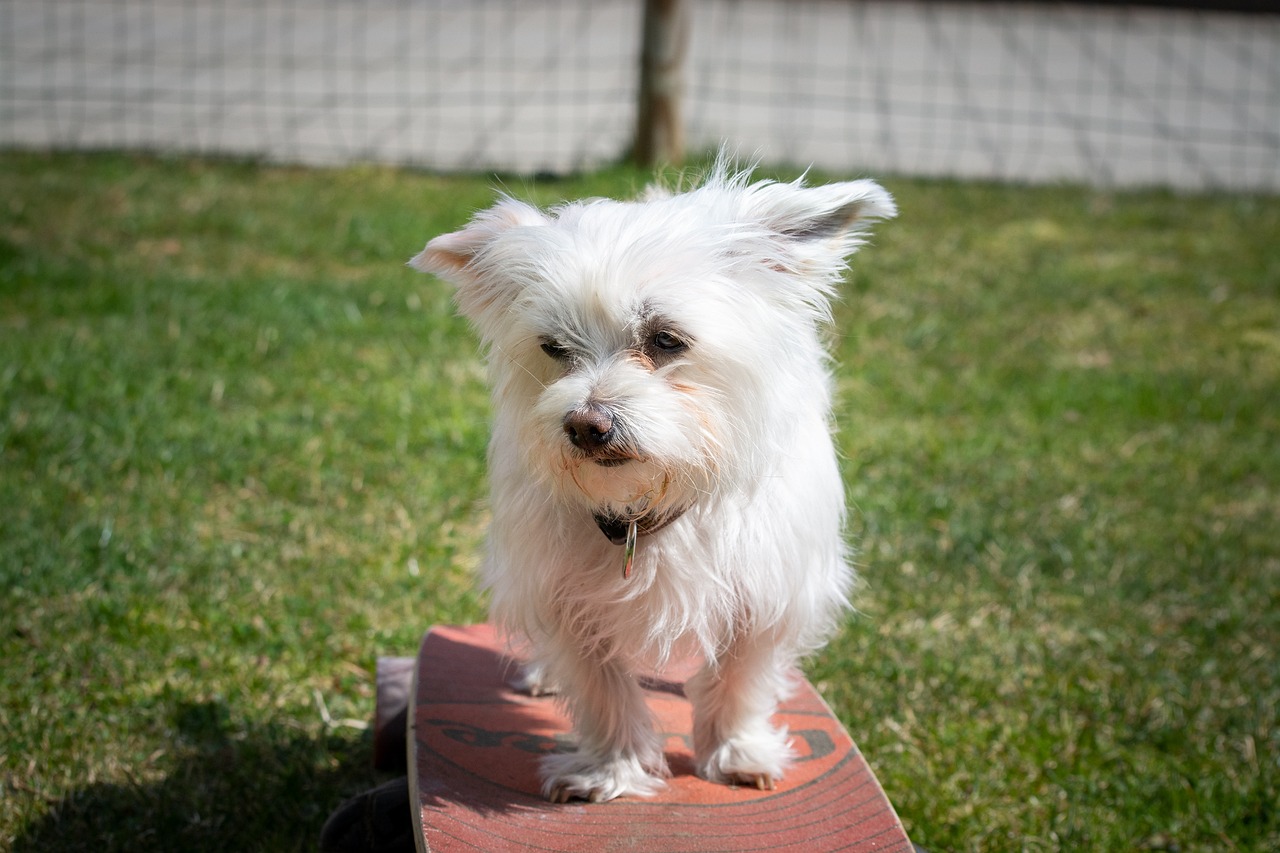
Training and Socialization
Training and socialization are essential components of raising a well-adjusted Havanese dog. These little furballs are not just cute; they are also incredibly intelligent and eager to please, which makes them relatively easy to train. However, their spirited nature can sometimes lead to stubbornness, so it’s important to approach their training with patience and consistency. Think of training a Havanese like teaching a child to ride a bike. At first, it may seem daunting, but with the right guidance and encouragement, they'll soon be zooming around with confidence!
Starting training early is crucial. Puppies are like sponges, soaking up everything around them, including commands and social cues. If you wait too long to start their training, you might find that they develop habits that can be challenging to break later on. Early exposure to different environments, sounds, and people will help them grow into well-rounded adults. Socialization is just as important as obedience training; it helps them learn how to interact positively with other dogs and humans.
When it comes to obedience training, positive reinforcement is the way to go. Havanese dogs respond exceptionally well to treats, praise, and playtime. For example, if your Havanese sits on command, reward them with a small treat and lots of enthusiastic praise. This not only reinforces the behavior but also strengthens the bond between you and your furry friend. Remember, consistency is key. Use the same commands and ensure everyone in the household is on the same page to avoid confusion.
Socialization can be approached through various activities. Here are some practical tips to help you effectively socialize your Havanese:
- Expose them to different environments: Take your Havanese to parks, pet-friendly stores, and even busy streets to help them adapt to various sounds and sights.
- Arrange playdates: Introduce your Havanese to other friendly dogs. This will help them learn proper doggy etiquette and build confidence.
- Invite friends over: Allow your Havanese to meet new people, ensuring that these introductions are positive and stress-free.
- Enroll in puppy classes: These classes provide structured socialization opportunities and are a great way to meet other dog owners.
Incorporating training and socialization into your Havanese's daily routine will not only make them a joy to be around but will also prevent behavioral issues down the line. Remember, a well-trained Havanese is a happy Havanese, and their playful, loving nature will shine even brighter when they feel secure in their training and social skills.
Q: How early should I start training my Havanese?
A: It's best to start training as soon as you bring your puppy home, ideally around 8 weeks old. Early training helps set a solid foundation for good behavior.
Q: Are Havanese dogs easy to train?
A: Yes, Havanese dogs are generally easy to train due to their intelligence and eagerness to please. However, consistency and patience are key.
Q: How can I socialize my Havanese effectively?
A: Socialization can be achieved through various activities such as exposing them to different environments, arranging playdates with other dogs, and enrolling in puppy classes.
Q: What training methods work best for Havanese dogs?
A: Positive reinforcement methods, such as treats, praise, and playtime, work best for Havanese dogs. They respond well to encouragement and love.
Obedience Training
When it comes to Havanese dogs, obedience training is not just a recommendation; it's a necessity! These little bundles of joy are not only intelligent but also eager to please, making them exceptionally trainable. However, it's essential to approach their training with a blend of patience and consistency. Think of training a Havanese like teaching a child to ride a bike; at first, they might wobble and fall, but with the right guidance and encouragement, they’ll soon be zooming around with confidence.
One of the most effective methods for training Havanese dogs is through positive reinforcement. This means rewarding them for good behavior rather than punishing them for mistakes. Imagine giving your pup a treat or showering them with praise every time they sit on command. This not only builds a strong bond between you and your dog but also reinforces desirable behaviors. Havanese dogs thrive on this kind of encouragement, and it makes the training process enjoyable for both parties.
To get started with obedience training, here are a few key commands you should focus on:
- Sit: A fundamental command that helps establish control.
- Stay: Teaches your dog to remain in one spot, which can be crucial for their safety.
- Come: This command is vital for keeping your Havanese safe, especially when off-leash.
- Leave it: This command helps prevent your dog from picking up harmful objects.
Each of these commands can be taught using short training sessions that last about 5 to 10 minutes. Keep in mind that Havanese dogs have a short attention span, so it's best to keep things fun and engaging. Incorporating play into your training sessions can turn a mundane task into an exciting game. For example, you could hide treats around the house and ask your Havanese to find them, rewarding them with praise when they do.
Consistency is key when training your Havanese. Use the same words and gestures for commands to avoid confusing your furry friend. Regular practice is essential; try to incorporate training into your daily routine. Whether it's during a walk or while playing in the backyard, every moment is an opportunity for learning.
Finally, don’t forget to socialize your Havanese during their training. Exposing them to various environments, people, and other pets will help them become well-rounded adults. A well-socialized Havanese is not only more confident but also more obedient, as they learn to adapt to new situations and follow commands in different contexts.
In summary, obedience training for Havanese dogs should be a delightful experience filled with positive reinforcement, consistency, and socialization. By investing time and effort into their training, you’ll not only have a well-behaved companion but also strengthen the bond between you and your furry friend.
Q: How long should I train my Havanese each day?
A: Aim for short sessions of 5 to 10 minutes, several times a day. It's more effective than one long session.
Q: What should I do if my Havanese doesn't respond to commands?
A: Stay patient and consistent. Try using higher-value treats or toys, and ensure you're in a distraction-free environment.
Q: Can I train my Havanese without professional help?
A: Absolutely! With the right resources, you can effectively train your Havanese at home. Just remember to be patient and persistent.
Q: When should I start training my Havanese?
A: Start as early as possible, ideally when they are puppies. Early socialization and training set the foundation for a well-behaved adult dog.
Socialization Tips
Socializing your Havanese dog is one of the most important steps you can take to ensure they grow up to be a well-adjusted and confident companion. Just like humans, dogs thrive on positive interactions and experiences, and the more exposure they have to different environments, people, and other animals, the better they will adapt to various situations. Imagine your Havanese as a sponge, soaking up all the experiences around them. The key is to start early. Begin socialization when your puppy is around 8 to 12 weeks old, as this is a critical period for developing their social skills.
When introducing your Havanese to new experiences, aim for a mix of both familiar and novel situations. For instance, take them to a friend's house where they can meet other pets and people. This helps them learn how to behave in different social settings. You can also visit parks, pet-friendly cafes, or even local pet events. Each outing is an opportunity for your Havanese to experience new sights, sounds, and smells that will enrich their understanding of the world.
One effective technique is to create a socialization checklist that includes various experiences you want your Havanese to encounter. Here are some ideas to get you started:
- Meeting other dogs
- Interacting with children
- Exploring different types of environments (urban, rural, etc.)
- Visiting pet stores
- Engaging in training classes
Keep in mind that the key to successful socialization is to make every experience positive. Use treats, praise, and playtime to reinforce good behavior. If your Havanese seems fearful or anxious in a new situation, don’t force them to engage. Instead, give them space and allow them to observe from a distance, gradually bringing them closer as they become more comfortable. Remember, patience is essential; every dog is different and will adjust at their own pace.
Additionally, consider enrolling your Havanese in a puppy kindergarten class. These classes not only provide structured socialization but also teach essential skills and obedience. It's a great way for your pup to learn how to interact with other dogs under the guidance of a professional trainer. The social skills they acquire in these settings will serve them well throughout their lives.
Lastly, always monitor your Havanese's body language during socialization. Signs of stress or discomfort, such as tail tucking, excessive barking, or hiding, indicate that they may need a break or a different approach. By being attentive to their needs, you are fostering a trusting relationship that encourages them to explore the world with confidence.
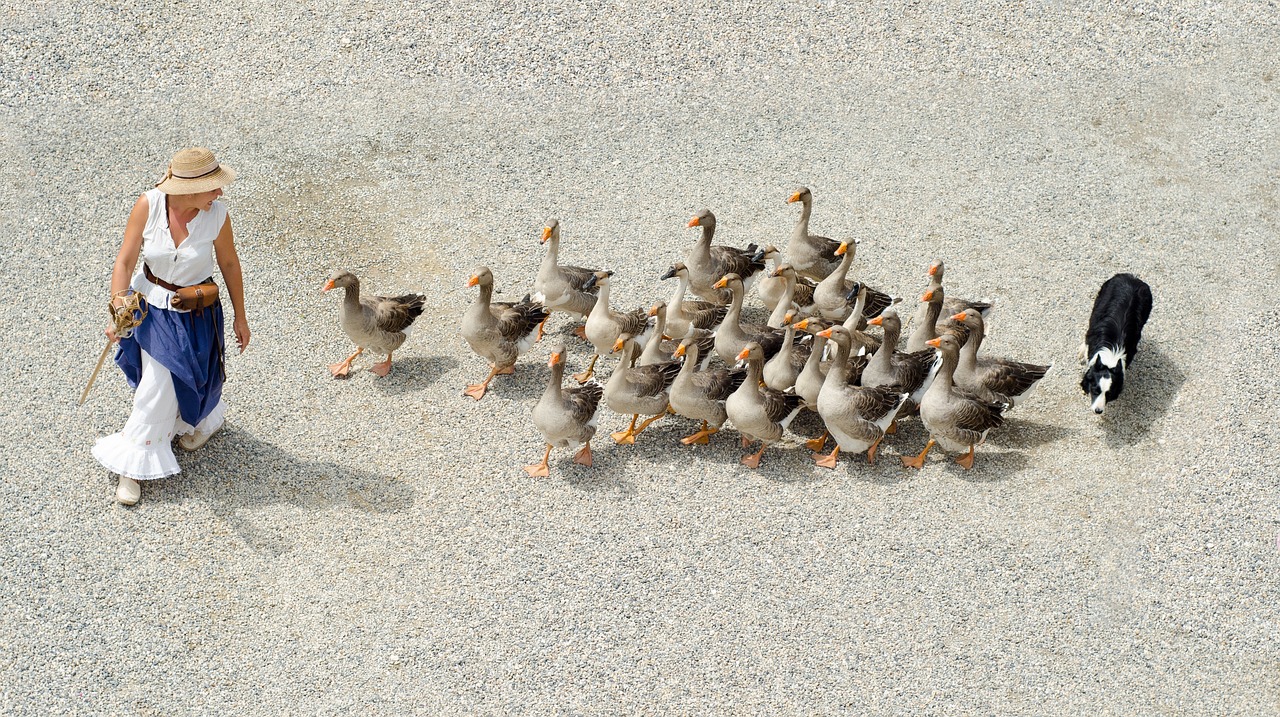
Havanese as Family Pets
When it comes to choosing the perfect family pet, Havanese dogs truly shine as a top contender. Their loving disposition and playful nature make them not just pets, but genuine members of the family. Imagine a small, fluffy companion who greets you with a wagging tail and a joyful bark every time you walk through the door. That’s the magic of a Havanese! They thrive on human interaction and are known for their affectionate behavior, which makes them incredibly suitable for families with children.
One of the standout traits of Havanese dogs is their gentle temperament. They are naturally sociable and enjoy being around people, which means they can easily adapt to the hustle and bustle of a family environment. Whether it’s playing fetch in the backyard or snuggling on the couch during movie night, these dogs are always eager to participate. Their playful spirit can turn any ordinary day into an adventure, making them wonderful companions for children who love to engage in fun activities.
Moreover, Havanese dogs are known for their compatibility with other pets. If you already have furry friends at home, you’ll be pleased to know that Havanese generally get along well with other animals. Their friendly nature allows them to create bonds with cats, dogs, and even smaller pets, provided they are introduced properly. However, it’s essential to monitor their interactions initially to ensure everyone feels comfortable and safe.
In terms of their interaction with children, Havanese dogs are often described as patient and playful. They have a knack for understanding the energy levels of kids and can match their enthusiasm. This makes them ideal playmates for children, as they love to engage in games of chase, tug-of-war, or simply running around the yard. Additionally, their small size means they can easily navigate the home without causing much disruption, making them perfect for families living in apartments or smaller spaces.
As with any pet, it's crucial to teach children how to interact with Havanese dogs respectfully. Educating kids on gentle handling and recognizing the dog's body language can foster a harmonious relationship. By instilling these values, you not only enhance the bond between your children and your Havanese but also promote empathy and responsibility in young ones.
In conclusion, Havanese dogs are more than just adorable companions; they are loving family members who bring joy and laughter into the home. Their affectionate nature, playful demeanor, and compatibility with children and other pets make them an excellent choice for families looking to add a furry friend to their lives. With proper care, training, and socialization, a Havanese can become a cherished part of your family for many years to come.
- Do Havanese dogs shed a lot? Havanese dogs have a long, silky coat that is considered hypoallergenic, meaning they shed less than many other breeds. Regular grooming helps minimize any loose hair.
- Are Havanese good with kids? Yes! Havanese are known for their gentle and playful nature, making them excellent companions for children.
- How much exercise do Havanese need? Havanese dogs require moderate exercise, including daily walks and playtime, to keep them healthy and happy.
- What is the average lifespan of a Havanese? Havanese dogs typically live between 12 to 15 years, depending on their health and care.
- Are Havanese easy to train? Yes, Havanese are intelligent and eager to please, which makes them relatively easy to train with positive reinforcement techniques.
Interaction with Children
When it comes to family pets, few breeds can match the delightful rapport that Havanese dogs share with children. These little furballs are not just cute; they are bursting with a playful spirit that makes them the perfect companions for kids. Imagine a tiny, fluffy cloud bouncing around the house, bringing laughter and joy wherever they go. Havanese dogs thrive on interaction and are known for their affectionate nature, which allows them to form strong bonds with the little ones in your family.
One of the remarkable traits of Havanese dogs is their innate ability to sense the moods of those around them. They are incredibly intuitive and can tell when a child is feeling happy or sad. This emotional awareness makes them not just pets but also loyal friends who can provide comfort when needed. Playtime with a Havanese is often filled with energy, as they love to engage in games of fetch or chase, making every moment spent together a joyous occasion.
Moreover, Havanese dogs are generally gentle and patient, which is crucial when interacting with younger children who may not understand how to treat animals with care. They are less likely to react negatively to a child’s exuberance or occasional clumsiness, making them a safe choice for families. However, it’s still essential to supervise interactions between dogs and very young kids to ensure that both parties are having a great time without any accidents.
To further illustrate the compatibility of Havanese dogs with children, consider the following benefits:
- Playfulness: Havanese dogs love to play and can keep up with even the most energetic kids.
- Affectionate Nature: They are known for their cuddly demeanor, providing warmth and companionship.
- Adaptability: These dogs can easily adjust to the noise and hustle of a lively household.
In summary, Havanese dogs are more than just pets; they are family members who bring joy, laughter, and love into the lives of children. Their playful and affectionate nature makes them a perfect match for families looking for a devoted companion that can grow alongside their kids. If you’re considering adding a Havanese to your family, you can expect a furry friend who will not only play with your children but also become a cherished part of your family dynamic.
Q1: Are Havanese dogs good with toddlers?
A1: Yes, Havanese dogs are generally very gentle and patient, making them a good choice for families with toddlers. However, supervision during playtime is always recommended to ensure safety for both the child and the dog.
Q2: How much exercise do Havanese dogs need?
A2: Havanese dogs are small but energetic. They require regular playtime and short walks, typically around 30 minutes a day, to keep them healthy and happy.
Q3: Can Havanese dogs be left alone with children?
A3: While Havanese dogs are friendly and usually get along well with children, it’s important to supervise their interactions, especially with very young kids, to prevent any accidents or misunderstandings.
Living with Other Pets
When it comes to integrating a Havanese dog into a home with other pets, the experience can be both rewarding and challenging. Havanese dogs are known for their friendly and sociable nature, which often makes them a great addition to multi-pet households. However, just like any other breed, their introduction to existing pets should be handled with care and consideration. It's essential to remember that every pet has its unique personality, and the dynamics can vary significantly depending on the individual animals involved.
One of the most important factors to consider is the temperament of the other pets in the household. For instance, if you have a more dominant pet, it’s crucial to supervise their interactions with your Havanese. Generally, Havanese dogs are playful and enjoy engaging with other animals, which can lead to delightful play sessions. However, if your existing pets are not as enthusiastic about new friendships, it can create tension. In such cases, gradual introductions and positive reinforcement are key.
To facilitate a smooth transition, here are some tips to keep in mind:
- Supervised Introductions: Always introduce your Havanese to other pets in a controlled environment. This allows you to monitor their interactions closely.
- Positive Reinforcement: Reward both your Havanese and other pets with treats and praise for calm behavior during introductions.
- Separate Spaces: Ensure that each pet has its own space to retreat to if it needs a break from socializing.
In many cases, Havanese dogs can form strong bonds with other pets, including cats and even larger dogs. Their playful demeanor and affectionate nature often help them to become the life of the party among other animals. It's not uncommon to see a Havanese engaging in a game of chase with a cat or snuggling up to a larger dog for a nap. This adaptability makes them a great choice for families with diverse pets. However, patience is essential, as building these relationships can take time.
Additionally, regular socialization from a young age can greatly influence how well a Havanese interacts with other pets. Introducing them to different animals, environments, and experiences can help them develop confidence and ease around other pets. Remember, a well-socialized Havanese is likely to be more accepting and friendly towards other animals, resulting in a harmonious household.
In conclusion, while Havanese dogs can thrive in a multi-pet environment, careful management of their introductions and ongoing interactions is crucial. By taking the time to ensure that all pets feel comfortable and secure, you can foster a loving and peaceful home where everyone, including your Havanese, can coexist happily.
Q: Are Havanese dogs good with cats?
A: Yes, Havanese dogs can get along well with cats, especially if introduced properly and socialized from a young age.
Q: How do I introduce my Havanese to a new pet?
A: Start with supervised introductions in a neutral space, use positive reinforcement, and allow each pet to have their own space.
Q: Can Havanese dogs live with larger dogs?
A: Yes, they can, but it’s important to monitor their interactions, as size differences can sometimes lead to unintentional rough play.
Frequently Asked Questions
- What is the temperament of Havanese dogs?
Havanese dogs are renowned for their friendly and affectionate nature. They are sociable and thrive on human interaction, making them great companions for families and individuals alike. Their playful demeanor ensures they get along well with children and other pets, creating a warm and loving environment.
- How do I care for a Havanese dog's coat?
Maintaining a Havanese's beautiful coat requires regular grooming. It's essential to brush their fur several times a week to prevent matting and tangles. Additionally, regular baths will keep their coat clean and healthy. Don't forget to schedule professional grooming every few months to maintain their stunning appearance!
- What size are Havanese dogs?
Havanese dogs are small but sturdy, typically weighing between 7 to 13 pounds and standing about 8 to 11 inches tall at the shoulder. Their compact size makes them ideal for various living situations, whether you have a spacious home or a cozy apartment.
- Are Havanese dogs good with children?
Absolutely! Havanese dogs are known for their playful and gentle nature, making them excellent companions for children. They enjoy engaging in playtime and are patient with kids, which fosters a loving bond between them.
- What are common health concerns for Havanese dogs?
Like any breed, Havanese dogs are prone to certain health issues, including hip dysplasia, eye problems, and heart conditions. Regular veterinary check-ups and a healthy diet can help manage these risks and keep your furry friend in tip-top shape.
- How can I train my Havanese dog effectively?
Training a Havanese requires patience and consistency. They are intelligent and eager to please, so using positive reinforcement techniques, such as treats and praise, can be very effective. Start with basic obedience commands and gradually introduce more complex training as they master the basics.
- What are some socialization tips for Havanese dogs?
Early socialization is crucial for Havanese dogs. Introduce them to various environments, people, and other animals from a young age. This exposure helps them become well-adjusted and confident adults. Consider puppy classes or playdates with other dogs to enhance their social skills.
- Can Havanese dogs live with other pets?
Yes, Havanese dogs generally get along well with other pets. Their friendly disposition allows them to adapt to living with cats and other dogs. However, proper introductions and monitoring their interactions will help ensure a harmonious household.

